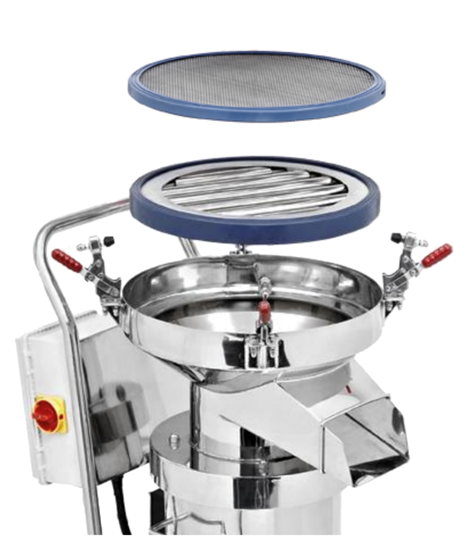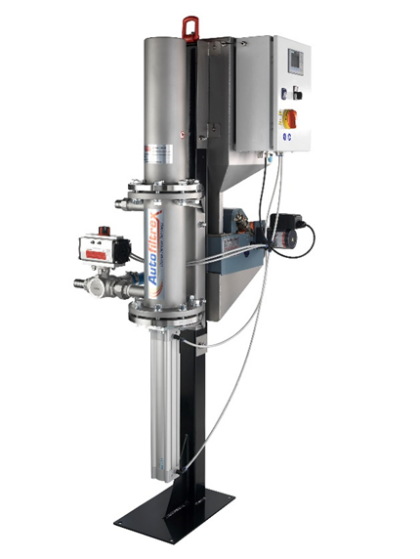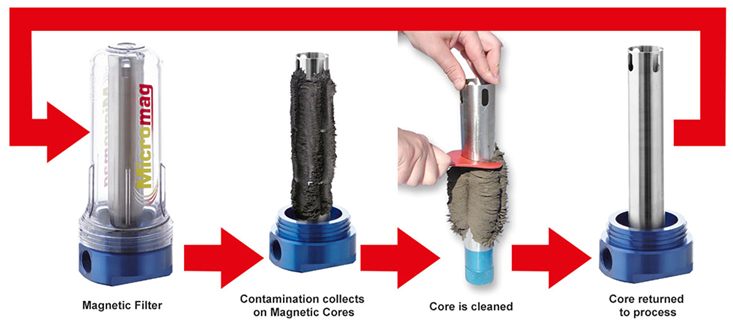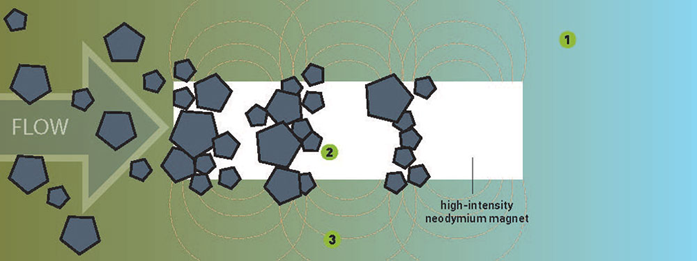
Eclipse Magnetics, a manufacturer of industrial workholding and separation systems based in the UK, has recently introduced several products in its lines of filtration equipment that demonstrate innovative new applications of magnetics technology for metals and food processing.
The company is now offering a full range of industry standard sieve magnets, shown in the picture above, to ensure product purity in the food industry. Easy to install, the sieve magnet is a full stainless-steel design which is fully compatible with industry standard and leading manufacturers of vibratory sieves.
Typically positioned beneath the sieve screen in food processing applications including dry powders and granulates, the new sieve magnets achieve excellent separation, says Eclipse. Due to the high intensity magnetic field, even sub-micron sized ferrous metal and paramagnetic contamination can be successfully attracted and removed.
“Ensuring product quality and purity is one of the greatest challenges faced by the processing industries. Our sieve magnets have a worldwide proven reputation in the food industry, ensuring protection against ferrous contamination, and maintaining efficiency and productivity within the production process,“ said Martyn Cotterill, general sales manager. The sieve magnets are available in 7,000 and 11,000 Gauss on product contact surface.

The company’s newly launched Autofiltrex range of automated filters, available in three sizes with features including fully automated cleaning and a magnetic reclaim unit, is designed to be a high performance magnetic filtration device for handling most ferrous machining applications such as grinding, honing, lapping, forming and quenching. It was exhibited in September at EMO Exhibition in Hannover, a trade fair for the metalworking industry.
“We were delighted to see that the Autofiltrex was a popular product at EMO,” said Steve McAllorum, sales and marketing director. “Not only did we receive plenty of enquiries and requests for more information, we also received a good amount of orders from manufacturers looking to improve efficiencies for precision metal finishing processes. This is a great example of how an investment in magnetic technologies can improve efficiency in automotive and other metal finishing operations.”
The new filters can be fitted in-line or off-line, ensuring 24/7 “ultra-polished” fluids and delivering considerable advantages over traditional filter media, said McAllorum. The modular design allows additional units to be added to accommodate increased flow rates, depending on application needs. Offering sub-micron filtration performance, the filters deliver cleaner fluid to the machine, therefore improving surface finish and accuracy as well as reducing expenditure on filter media.
They are among an extensive line of filters manufactured by Eclipse. It provides a full range of coolant, oil, water, and industrial fluid filtration systems. Today’s systems, the company notes, are massively advanced from traditional applications of magnets to remove ferrous particles.

The basic principle of magnetic filtration, also referred to as magnetic separation, is that fluid flows around a magnetic rod or core which attracts ferrous particles, removing them from the fluid and ensuring that clean fluids are returned to the contact area either on a machine tool or wash system. When the magnetic core becomes saturated with ferrous contamination it is then cleaned either manually or, in the case of the Automag, automatically.
In the past magnetic systems were very basic, often consisting of randomly placing a low strength magnetic bar or rod in a settlement tank or a low strength magnetic roller, the results are largely ineffective. Whilst the basic principles are similar, there are huge differences in the product design and levels of performance between the magnetic systems of the past and its advanced magnetic filters and the magnetic systems today.
Eclipse uses use high strength neodymium magnets which attract virtually 100% of the ferrous particles including sub-micron size particles. The advanced magnetic core design creates a magnetic field pattern which ensures that the filters do not block even in high contamination applications.

In addition to magnetic performance, its design and development team also researched fluid flow characteristics, hence its filters are designed to optimize the fluid flow, thereby maximizing contamination exposure to the magnet and ensuring almost 100% collection rates without interrupting or reducing the fluid rates.
Magnetic filters or magnetic separators are more effective at removing ferrous particles than virtually all other types of filtration, says Eclipse. Traditional barrier filters are constrained by the pore size in the barrier. Make the pore too big and contamination continues to circulate, make the pore too small and it blocks. According to Eclipse, its patented magnetic design means that the filter will not block so there is no blinding or pressure build up.
Based in Sheffield, Eclipse makes a broad array of magnetic-based products including workholding systems, magnet assemblies, workshop tools, lifting and handling systems, industrial filters, foreign body removal and plumbing products. It also provides custom magnetic assemblies for OEMs in the electronics, automotive, aerospace, pumps, audio equipment, sensors and security sectors as well as serving research and development efforts and academic institutions. Part of the Spear & Jackson Group, Eclipse operates globally through Eclipse Tools North America based in Canada, and other operations in China and France.
For more info, see www.EclipseMagnetics.com.



